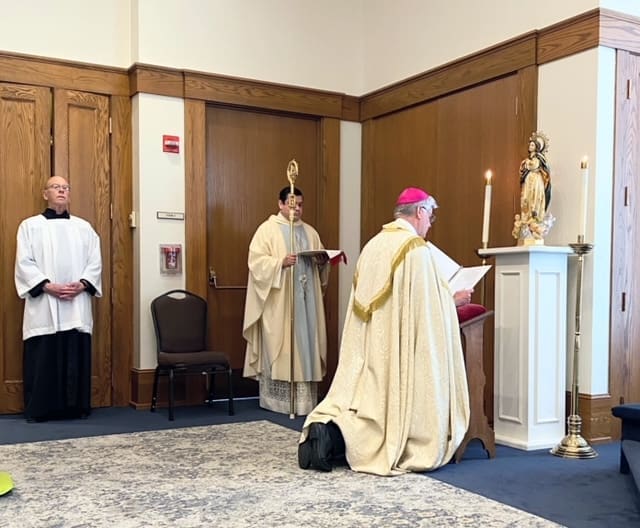Peace on Earth: No more war!
By ARCHBISHOP GREGORY J. HARTMAYER, OFM Conv. | Published April 1, 2022 | En Español
In 1963, Pope St. John XXIII issued his encyclical letter, Pacem in Terris (Peace on Earth).
It was the time of the Cold War, the erection of the Berlin Wall and a growing threat of nuclear war. In fact, Pacem in Terris was a response to the Cuban missile crisis in which the world narrowly avoided a nuclear war. The encyclical rightly pointed out that peace can only be achieved through obedience to God’s law.
While papal documents up to that point addressed Catholics, this encyclical was addressed to all people of good will. When John XXIII wrote Pacem in Terris, it was against the backdrop of two world wars, as well as national conflicts throughout the world and at a time when the world was even more fragile. A central role was given to the theme of human rights.

Archbishop Gregory J. Hartmayer, OFM Conv.
Among the points that are made: Each person has the right to life and the means necessary to live their life. In addition, all of humanity has a natural right to be respected, to worship God, to live their life as they choose, to work and support a family, to form associations, to emigrate, and to take an active role in public life. All people also have a duty to preserve their life, to respect the rights of others, work together for the common good, and maintain an attitude of responsibility.
Relations between states ought to also be characterized by truth, justice, willing cooperation, and freedom. Nations who have achieved significant scientific, cultural and economic development should not exert unjust political domination over other states, but instead ought to use their advances to advance the global common good. Each country has the right to existence, to self-development and the means to achieve their development.
Once again, we are witnessing another war of massive proportions. On Feb. 24, Russia began its invasion of Ukraine. In the words of one commentator, this war “has disrupted the lives of millions of people and dramatically turned the clock of history back to the last century, to the time of the Cold War.” A sovereign nation has been violated, human rights have been ignored, millions of refugees have sought refuge in other countries, lives have been lost, families have been torn apart and the situation continues to decline.
The very rights spoken of at length by John XXIII have been trampled upon. The news and images from Ukraine are truly devastating. Our eyes are filled with tears; tears of anguish and tears of sorrow. Our hearts are heavy, weighed down with immeasurable sadness. God’s plan for his people is peace, not disaster, not war. But peace in Ukraine has been stolen and the consequences are disastrous. Who knows when this will end or how it will end?
Since the outbreak of the war, Pope Francis has appealed for peace. In his Angelus address on March 13, he turned his attention in a special way to the city of Mariupol that has been besieged for several weeks by Russian troops.
He said: “Brothers and sisters, we have just prayed to the Virgin Mary. This week, the city that bears her name, Mariupol, has become a city martyred by the heartbreaking war that is devastating Ukraine. Faced with the barbarity of the killing of children, and of innocent and defenseless citizens, there are no strategic reasons that hold up: the only thing to be done is to cease the unacceptable armed aggression before the city is reduced to a cemetery. With an aching heart I add my voice to that of the common people, who implore the end of the war. In the name of God, let the cries of those who suffer be heard and let the bombings and attacks cease! Let there be a real and decisive focus on negotiation, and let the humanitarian corridors be effective and safe. In the name of God, I ask you: stop this massacre!”
Like John XXIII, Pope Francis has made his plea to all people of good will. The situation in Ukraine reminds us, once again, of how fragile our world is. After the horrors of two world wars, a cry resounded throughout the world: “No More War!” Sadly, it is a call that landed on deaf ears.
An act of consecration
While we might feel paralyzed in the face of military might and political will, we are by no means helpless. There is a spiritual battle underway and the Holy Father has asked us to pray and fast for the conversion of hearts.
The prophet Jeremiah wrote: “My plans for you are for peace, not for disaster; To give you a future, a future filled with hope.” (Jer 29:11) Blessed are the Peacemakers! On the Solemnity of the Annunciation, Pope Francis consecrated all of humanity, and especially Russia and Ukraine to the Immaculate Heart of Mary to implore peace. Bishops throughout the world joined the Holy Father in the Act of Consecration to pray for an end to the violence and suffering of innocent people.
He wrote: “This Act of Consecration is meant to be a gesture of the universal Church, which in this dramatic moment lifts up to God, through his Mother and ours, the cry of pain of all those who suffer and implore an end to the violence, and to entrust our human family to the Queen of Peace.”

Bishop Bernard E. Shlesinger III joined Pope Francis in a prayer of consecration of all people and especially Ukraine and Russia to the Immaculate Heart of Mary March 25 at the Cathedral of Christ the King in Atlanta. Photo by Celina Knoblock
In Atlanta, the Act of Consecration was led by Bishop Ned Shlesinger at the Cathedral of Christ the King on the same day. This past week, a Service of Prayer for Peace in Ukraine was held at Holy Spirit Church, Atlanta. The priests of Mother of God Ukrainian Catholic Church and St. Andrew Ukrainian Orthodox Church and their chanters led the congregation in the “Moleben During Time of War,” which is a service of intercession and supplication. At the end of the Service, the Ukrainian National Anthem was sung.
As beautiful as these prayers and gestures are, we must continue to pray, fast and support the relief efforts underway. Even if the war should cease, lives have to be rebuilt and a nation has to be restored.
Returning to John XXIII’s encyclical Pacem in Terris, we make his prayer our own:
“Let us, then, pray with all fervor for this peace which our divine Redeemer came to bring us. May He banish from the souls of men whatever might endanger peace. May He transform all men into witnesses of truth, justice and brotherly love. May He illumine with His light the minds of rulers, so that, besides caring for the proper material welfare of their peoples, they may also guarantee them the fairest gift of peace.
Finally, may Christ inflame the desires of all men to break through the barriers which divide them, to strengthen the bonds of mutual love, to learn to understand one another, and to pardon those who have done them wrong. Through His power and inspiration may all peoples welcome each other to their hearts as brothers, and may the peace they long for ever flower and ever reign among them. Amen.”